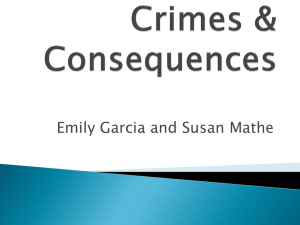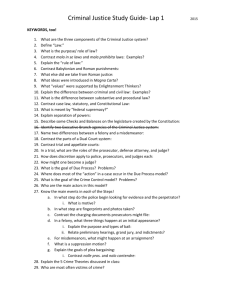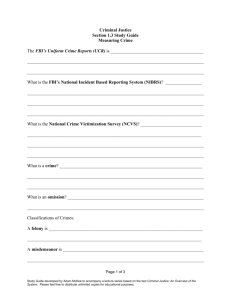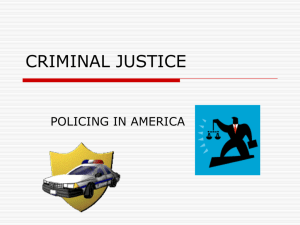More Information - Resources for Single Moms
advertisement
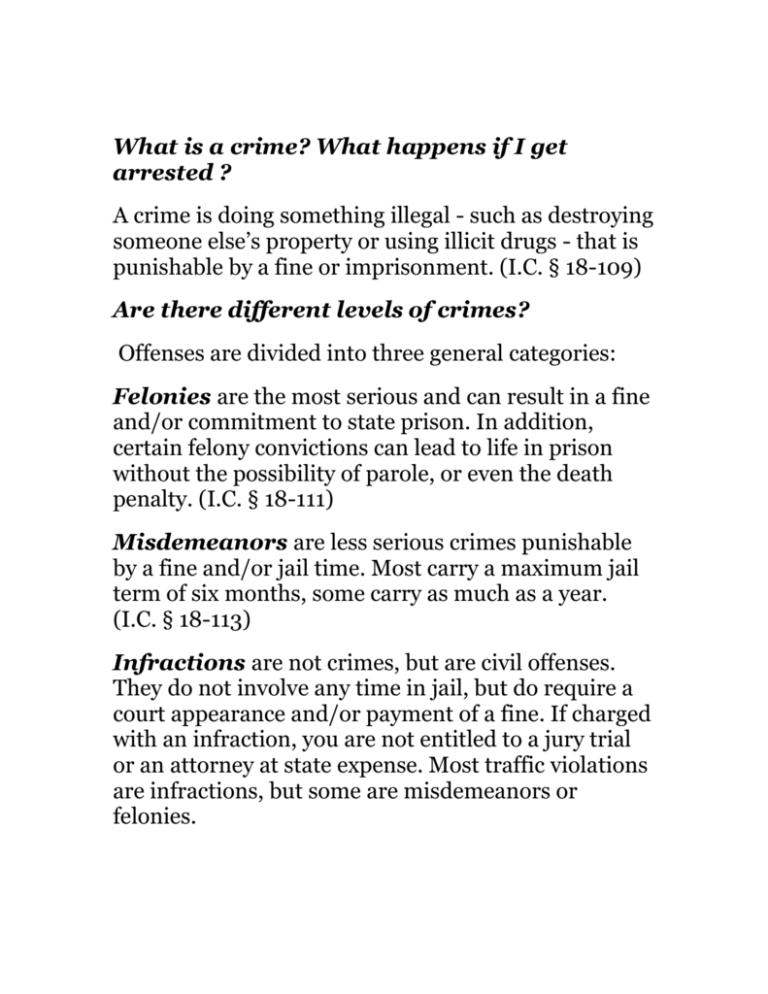
What is a crime? What happens if I get arrested ? A crime is doing something illegal - such as destroying someone else’s property or using illicit drugs - that is punishable by a fine or imprisonment. (I.C. § 18-109) Are there different levels of crimes? Offenses are divided into three general categories: Felonies are the most serious and can result in a fine and/or commitment to state prison. In addition, certain felony convictions can lead to life in prison without the possibility of parole, or even the death penalty. (I.C. § 18-111) Misdemeanors are less serious crimes punishable by a fine and/or jail time. Most carry a maximum jail term of six months, some carry as much as a year. (I.C. § 18-113) Infractions are not crimes, but are civil offenses. They do not involve any time in jail, but do require a court appearance and/or payment of a fine. If charged with an infraction, you are not entitled to a jury trial or an attorney at state expense. Most traffic violations are infractions, but some are misdemeanors or felonies. What happens if I am arrested? You will be searched, handcuffed, and taken to a police station. If you are questioned following your arrest, the police should advise you of your rights commonly known as the “Miranda” warning - under the United States Constitution (Miranda v. Arizona, 384 U.S. 436). Be careful what you say to anyone at the police station - even if you are behind closed doors. You have no right to privacy in a police station. Once you have identified yourself, you can refuse to discuss your case with police. Law enforcement officers cannot threaten you or force you into answering questions. Also, you have the right to have an attorney present during any questioning. If you cannot afford to hire an attorney, the court will appoint one for you. (I.C. § 19-852) You may, however, choose to answer questions, sign papers, or submit to tests. Just be aware that such information, if given voluntarily, can be used as evidence against you in court. What happens after I have been arrested and “booked”? An “initial appearance” in court usually occurs within 24 hours. If you are arrested on a weekend, however, you may have to wait until Monday morning when court opens. (Idaho Criminal Rule 5) Can someone bail me out? Maybe, It depends on the circumstances of your case. Bail is designed to guarantee your appearance in court. The court will often require that a certain amount of money be deposited with the clerk of courts. Sometimes the court allows the deposit of a bond or the title to a home. Usually a member of your family must obtain the funds, deposit the money, and show the receipt in order to get you released. In some situations, you could be released on your own recognizance without posting bail. (I.C. § 19-2904; Idaho Criminal Rule 46) If my record is sealed, is it really out of reach? Even when a record has been sealed by the court, a partial record remains. Once a record has been sealed, the police, probation department, and court cannot legally release any information about it unless reopened by court order. (I.C. § 20-525A) What are some consequences of having a criminal record? A driver’s license may be denied on the basis of a criminal record, and many jobs require a car . (I.C. s 49-303) A criminal record might prevent a person from being accepted by the college or University of his or her choice. A person who has been convicted of a crime may be prevented from entering the armed forces. A person who has been convicted of a felony loses the right to vote. Many businesses require employees to be bonded. An insurance company usually refuses to bond anyone who has been convicted of a felony. Some employment may be closed to those convicted of a crime or those who committed and offense which would be a crime if committed by and adult. If you are convicted of a felony , you will also lose your right to possess a firearm . While some of your civil rights will be given back to you once you have completed any prison term and are off probation or parole, your right to possess firearms will be lost permanently if you are convicted of certain serious felonies. (I.C.s 18-310) Are there state and federal criminal laws? Yes. In Idaho, most criminal laws can be found in the Idaho Penal Code, but criminal acts are also defined in other parts of the law. For example, some city and county ordinances - such as curfew laws, laws against smoking, and laws requiring smoke detectors or fire escapes – are considered criminal laws as well. In addition, the federal government has its own system of courts, law enforcement agencies, and laws. The federal courts also have their own sentencing provisions and correctional agencies.
